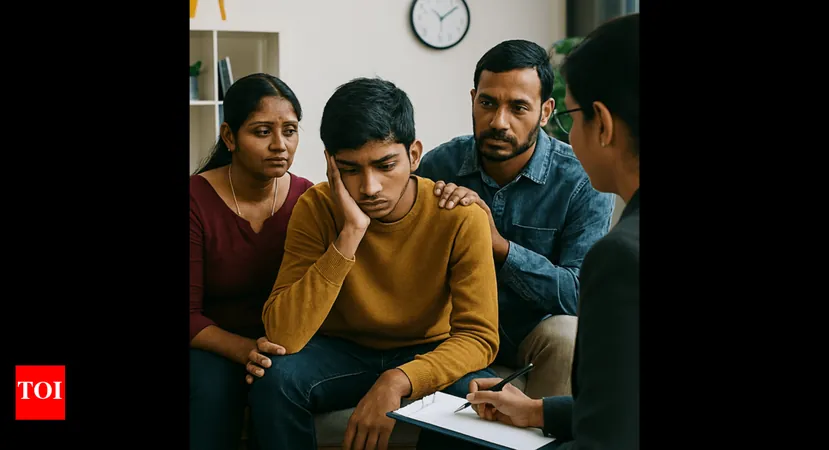
The Alarming Rise of Mental Health Disorders in Children: A Deep Dive
2025-09-08
Author: John Tan
A Disturbing Trend on the Rise
Psychiatrists are witnessing a shocking surge in mental health issues among children, with alarming cases of suicidal thoughts and self-harm emerging in kids as young as nine. In India, studies indicate a dramatic increase in anxiety disorders among children and adolescents, raising urgent concerns within the medical community.
Startling Cases of Suicidal Thinking
Dr. S Janani, a psychiatrist, reports on a troubling phenomenon: four children aged nine to fifteen sought her help, all expressing suicidal feelings. One boy even resorted to stealing his grandparents' medications in an attempt to end his life. Dr. Janani is particularly alarmed by the frankness with which these children discuss their struggles, highlighting a disturbing level of despair at such a young age.
Early Signs of Serious Mental Illnesses
Traditionally, signs of major mental illnesses like depression and schizophrenia appear in late adolescence, but Dr. Lakshmi Vijayakumar, founder of the suicide helpline SNEHA, notes that mood disorders are now being identified in children as young as nine. She recently treated a nine-year-old boy displaying hypomanic symptoms, characterized by reckless behavior and an unsettling confidence that often disrupted his classroom.
Self-Harm Among Younger Children
Worryingly, Dr. Janani also encounters children under twelve engaging in self-harm, employing sharp objects to cut their wrists — behaviors once attributed to older teens. Dr. Janani emphasizes that these alarming actions are clear cries for help from the children.
Rising Suicide Rates in India
A pivotal study in 2024, analyzing suicide trends among Indian youth from 1995 to 2021, revealed a concerning increase in suicide rates among children. Another study published in Frontiers highlighted a staggering 113.3% rise in anxiety disorders in India from 1992 to 2021, with particularly concerning peaks in children aged 10-14.
Debate on Causes of Mental Health Issues
While the reasons behind this troubling trend remain debated among experts, Dr. Ennapadam Krishnamoorthy suggests these mental health conditions may have always existed but are now being more frequently diagnosed. Many young patients are arriving at clinics with self-identified conditions, reflecting greater awareness and willingness to seek help.
Changing Attitudes Towards Mental Health
Dr. Janani notes that today's youth are more informed about mental health terminology than previous generations. This shift is encouraging, as children increasingly feel comfortable discussing mental health challenges. They are often supported by school counselors, and there's a growing acceptance among peers that mental health issues are common and manageable.
Impact of Social Factors on Mental Wellbeing
Experts point to several factors contributing to the early onset of mental health disorders: social media addiction, changing family dynamics, and high parental expectations. The rise of the nuclear family has left many children without the extended family support that once offered stability. Moreover, excessive screen time correlates with higher levels of anxiety and depression, emphasizing the urgent need for balance in daily routines.
Finding Paths to Support and Recovery
While awareness and family education regarding mental health are improving, there remains resistance to seeking treatment, both from children and their families. Dr. Janani urges early identification and intervention, stating that quicker diagnosis and treatment generally result in better outcomes.
What Lies Ahead?
As professionals assess the landscape of children's mental health, there is a critical need for support systems that don’t stigmatize but rather promote understanding and healthy communication. The challenges are multifaceted, and while the road ahead may be tough, the increased openness toward discussing mental health gives hope for a healthier future generation.
Reasons Behind the Alarm
- Chronic sleep deprivation due to social media use - Excessive gaming - Early exposure to substance abuse - Changing family structures leading to a lack of support - Early puberty impacting mental states - Genetic predispositions amplifying risks - Dysfunctional family dynamics leading to emotional distress.


 Brasil (PT)
Brasil (PT)
 Canada (EN)
Canada (EN)
 Chile (ES)
Chile (ES)
 Česko (CS)
Česko (CS)
 대한민국 (KO)
대한민국 (KO)
 España (ES)
España (ES)
 France (FR)
France (FR)
 Hong Kong (EN)
Hong Kong (EN)
 Italia (IT)
Italia (IT)
 日本 (JA)
日本 (JA)
 Magyarország (HU)
Magyarország (HU)
 Norge (NO)
Norge (NO)
 Polska (PL)
Polska (PL)
 Schweiz (DE)
Schweiz (DE)
 Singapore (EN)
Singapore (EN)
 Sverige (SV)
Sverige (SV)
 Suomi (FI)
Suomi (FI)
 Türkiye (TR)
Türkiye (TR)
 الإمارات العربية المتحدة (AR)
الإمارات العربية المتحدة (AR)